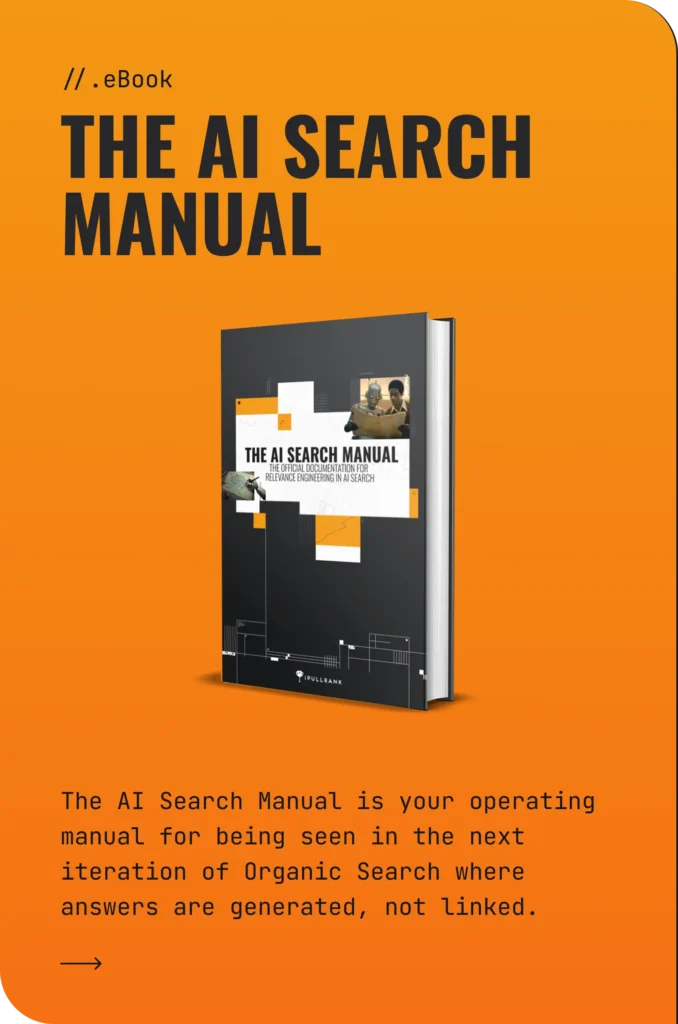Did Google just change SEO forever?
No. And yes.
But that’s the question coming out of Google I/O this year.
Take a moment to watch the sizzle reel:
AI Mode has arrived
The biggest headline: AI Mode is rolling out to everyone in the US as of May 20th.
AI Mode was in experimental mode for the past few months. It’s built on Google’s most advanced LLM, Gemini 2.5.
Is it just the Gemini App disguised as search? Not exactly. There are a few subtle differences.
- Standalone vs. Integrated: Gemini is a standalone app, while AI Mode is integrated into Google Search.
- Broader Range of Tasks: Gemini is designed for a wider range of tasks beyond information retrieval, whereas AI Mode primarily focuses on enhancing search.
- Primary Interaction: Gemini is primarily conversational, while AI Mode still retains elements of traditional search with AI enhancements.
- Monetization: AI Mode will be influenced by ads, while Gemini interactions in the Gemini app are (hopefully) less likely to be targeted by ads.
Honestly, it feels like the only reason that Gemini hasn’t completely replaced Google Search yet is due to market penetration as the default entry point for people.
Hot take #1: If we want to look further into the future, AI assistants will eventually replace any search app. The function of search will just be part of the entire OS.
Hot take #2: After sleeping on it, I don’t think AI Mode will have the initial impact that SEOs will assume. Even with the addition of an extended search bar, placement on Google Search as the first tab, and little AI Mode search buttons scattered throughout the website, it won’t disrupt our normal search behavior.
AI Overviews were different. They were intrusive and forced. We can’t turn them off. They appear above organic search results. They’re unavoidable.
Google will eventually make AI Mode the primary entry point to search and include a ‘web filter’ tab (H/T to Gianluca Fiorelli’s AI Mode article pre-Google I/O).
But that doesn’t mean SEOs and marketers shouldn’t begin to adjust their content strategy for organic search visibility.
Why?
Query Fan-Out
Understanding the Query Fan-Out
In the context of Google’s AI-powered search, query fan-out is a technique used to broaden the scope of a user’s initial search query and gather more comprehensive results. Rich Sanger and other SEOs stumbled upon the technique when we were all researching the Search Generative Experience.
Why were AI Overviews pulling content from pages that didn’t rank in the top 10 let alone the top 100, for the search query?
Turns out that it was the Query Fan-Out, which Google Search’s VP of Product, Robby Stein explained back in March.
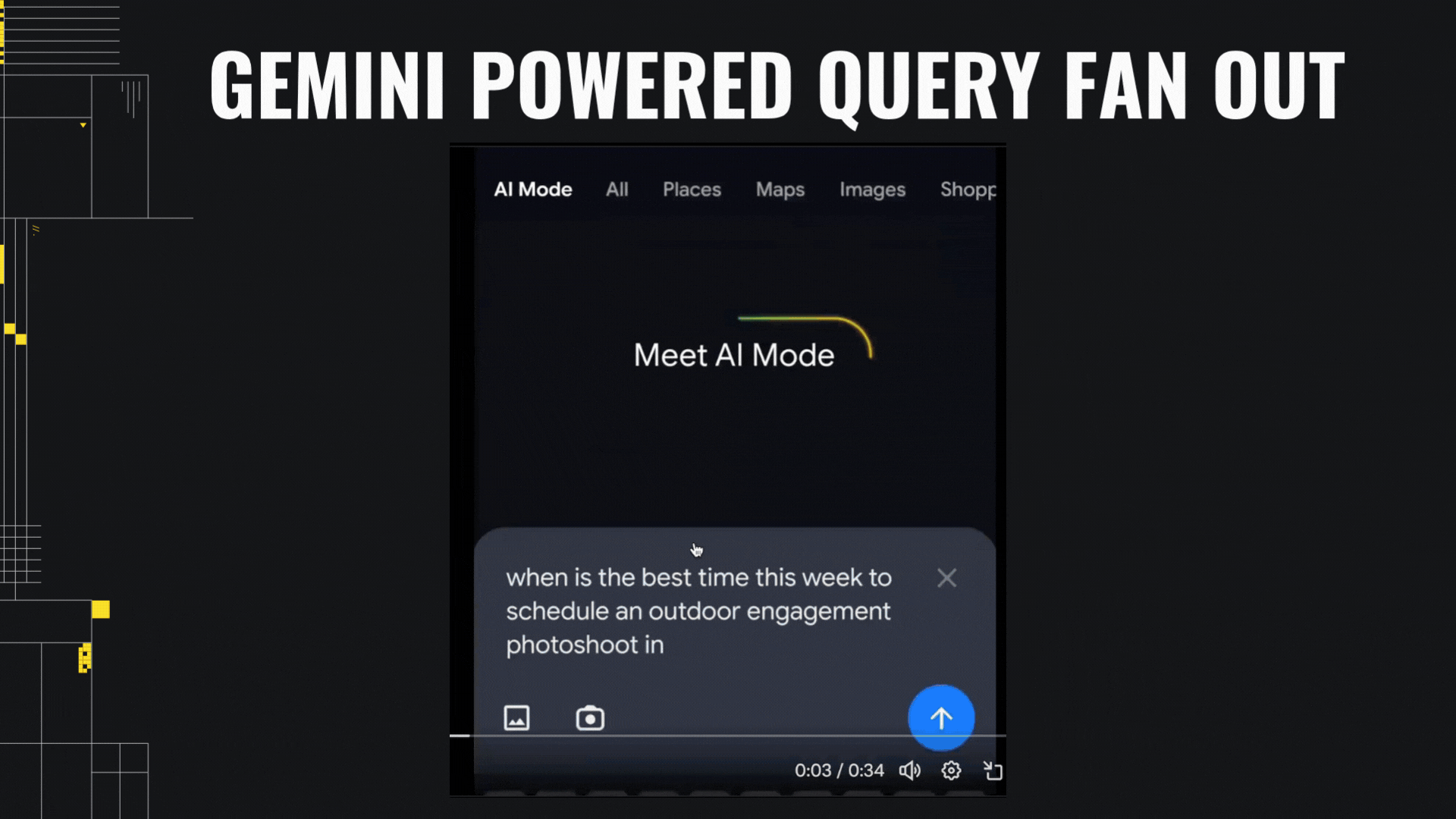
How it Works:
- Query Decomposition: When a user enters a query, the AI system analyzes and breaks down the initial query into multiple related sub-queries or subtopics.
- Parallel Searching: These sub-queries are then executed concurrently, allowing the AI to explore a wider range of information from different sources (websites, knowledge graph, search context data).
- Information Synthesis: The results from these parallel searches are gathered and analyzed by the AI system.
- Comprehensive Response: Finally, the AI synthesizes the gathered information into a cohesive and comprehensive response for the user, presented as an AI overview or a conversational answer in AI mode.
Assuming that the information is accurate, Google is predicting all of the relevant questions and follow-up questions that someone might have. Is it worth it?
From a Consumer Perspective:
- Benefit: Query fan-out provides a richer and more comprehensive answer to the user’s question by exploring multiple facets of the topic and gathering information from various sources.
- User Experience: In AI mode, this results in more thorough answers, conversational interactions, and the ability to ask follow-up questions based on the information provided.
But for SEOs/Content Strategists, the implications complicate our jobs. It offers pros and cons:
- SEO: Traditional ranking factors and keyword strategies aren’t relevant anymore. We don’t know how much AI might prioritize websites differently based on its broader information gathering and generative approach. To what extent will authority, content relevance, and user experience matter? Does your website experience matter as much anymore if Google doesn’t care about sending people to your website?
- Content Strategy: Content creators need to adapt their content strategy to focus on providing comprehensive, authoritative, and trustworthy information that can be synthesized and utilized by the AI system.
- Discoverability: Although some businesses may find it harder to rank through traditional SEO methods, new opportunities might arise as their websites could be featured or recommended by the AI in its synthesized responses or AI mode.
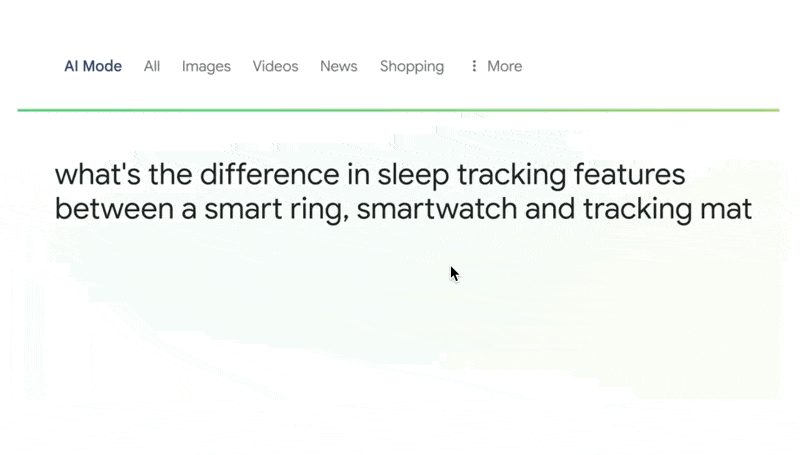
How good will these results be? I joked on X that I can’t wait to see Lily Ray get her hands on AI Mode testing. But essentially, there are going to be a lot of problems with the results. It’s the nature of search behavior and LLMs.
When people search for something without a good answer, they will make something up. LLMs inevitably hallucinate. While they’ve improved, that’s not something that’s been solved.
To what extent will problematic answers erode trust?
I believe that Google has a large margin for error. Despite anecdotal claims that people use TikTok, Reddit, Perplexity, and ChatGPT for search, I don’t think the data shows a massive migration to any of those platforms.
They aren’t better than Google, and they don’t have the frictionless entry points that Google has across many devices and digital ecosystems.
Speaking of somewhat pointless anecdotal examples. Check out my local search for a good pizza place based on reviews:
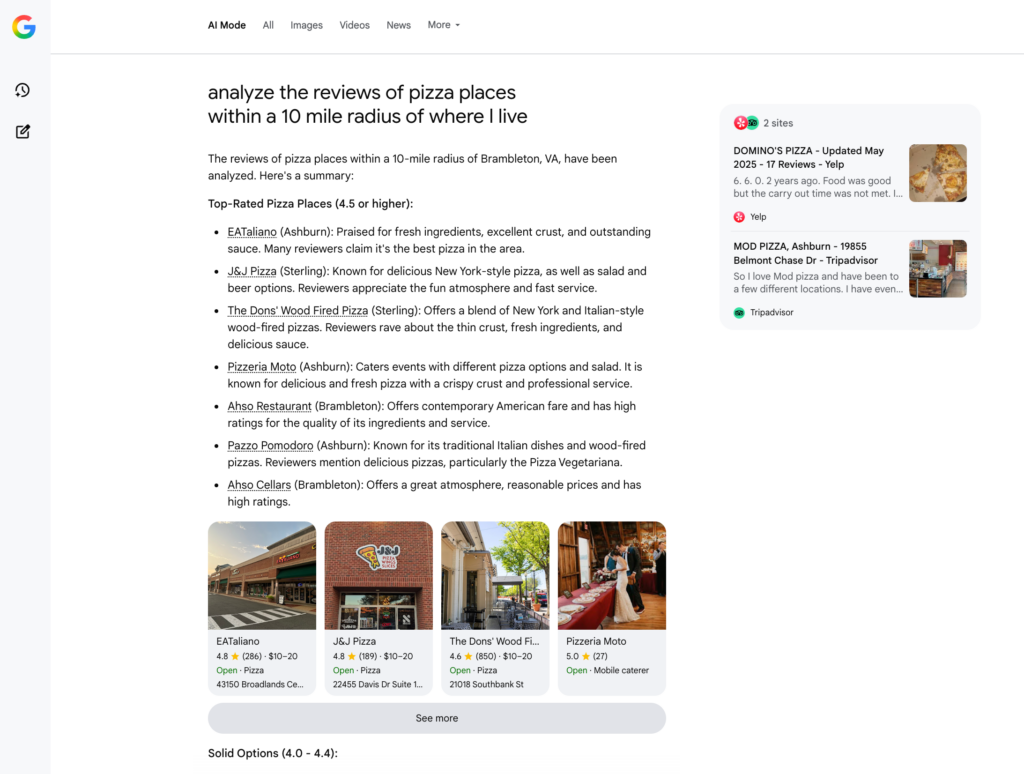
Now, I will ignore that it considers Domino’s a ‘solid option.’ There will still be many problematic results, which I’m sure we’ll hear about from the SEO community. The aggregations are riddled with errors. But at a glance, it serves my purpose, and from personal experience, these results are ‘Goog enough.’
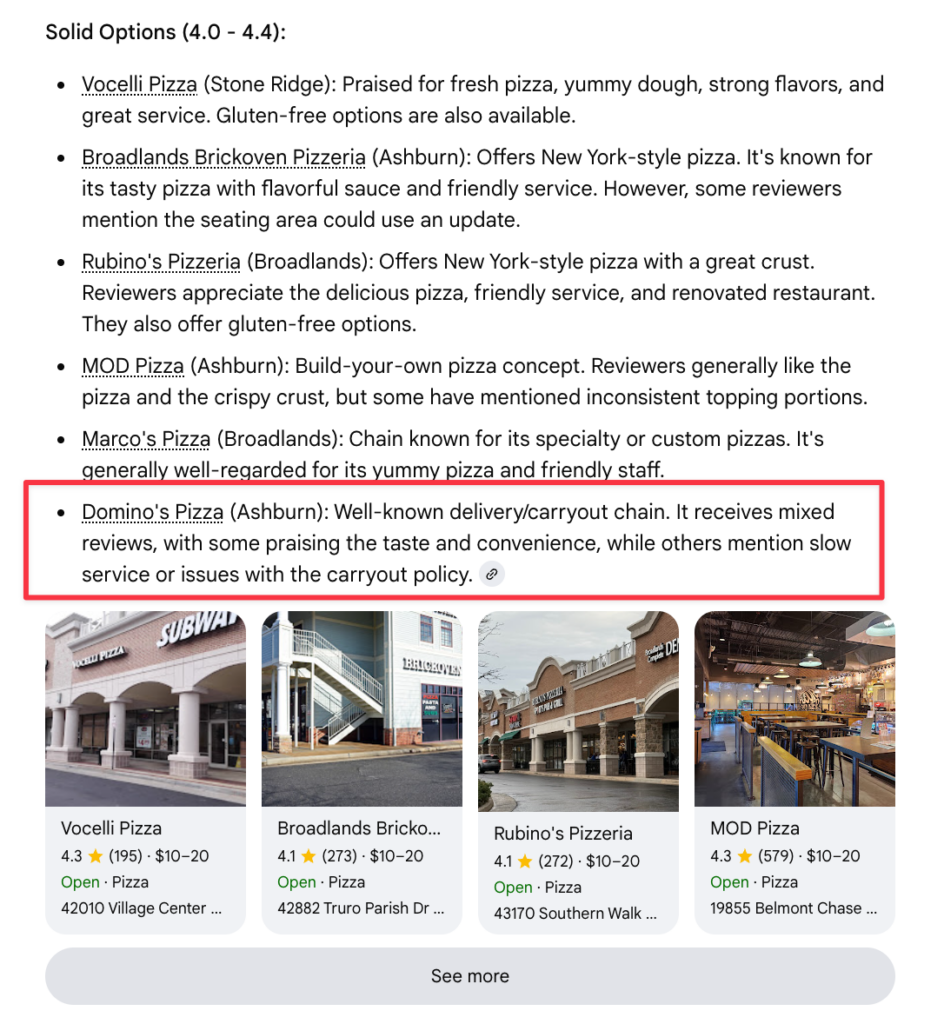
As mentioned, from my personal experience, I didn’t find myself switching over to the AI Mode tab for anything other than SEO curiosity. Unless Google makes it the default version of search, I don’t think it will have the immediate impact that we’re all scared of. I do anticipate that it will become the default mode over time.
AI Overviews felt more disruptive because it’s a forced experience. They appear at the top of a growing number of SERPs without the ability to turn them off.
Regardless, SEOs must prepare for the continued increase in AI Overviews with an inevitable switch to AI Mode.
When that does happen, we’ll see a fundamental shift in SEO as an industry.
What intrigues me is the impact of another Google I/O announcement:
Personal Context
As SEOs, we’ve always been accustomed to a certain amount of stability in search results. Even if search rankings fluctuated, the top 10 were generally the same for everyone, with some slight variability. We might have been used to getting different search results based on our device or location. We expected that.
But with Personal Context, Google will now pull in data from across your entire ecosystem—Gmail, search history, interests, and preferences—to tailor results specifically to you. It will be a much more personalized and dynamic search experience.
What I see for my search will be completely different from what you see.
What that means: We’re heading into a split experience. On one side, searchers who stay logged in and get ultra-personalized results. On the other hand, searchers who opt out think of it as a persistent incognito mode. Either way, search results are no longer standardized. They’re custom.
You can already update your personalization options here: https://www.google.com/search-personalization/

A 40-year-old guy with a family in Virginia who’s into SEO, sports, and movies will see a completely different set of results than a 25-year-old on the West Coast with different interests and income. That changes how we think about content strategy and how we measure success.
- Click-through rates? Likely to continue to drop.
- Rank tracking? Pretty much obsolete.
- Topic coverage and brand presence? That’s where the focus shifts.
We don’t even know if Google will give us visibility into this through Search Console. Unlikely.
Search behavior and query length will also continue to change. We’re moving toward longer, more detailed prompts. Instead of “best basketball shoes,” users might search, “What are the best black or gray basketball shoes under $60 for a 40-year-old with bad knees?” (My knees are fine, by the way.)
This makes traditional keyword tracking irrelevant. It forces us to rethink how we create context-rich, conversational content that covers more specific user intents.
Then there’s the introduction of agents within search.
Not just passive interfaces, but active doers.
Ask for Nationals–Phillies tickets in a specific section? It’ll buy them. Ask what horror movies are playing within 10 miles between 2 p.m. and 10 p.m.? It’ll find one, book it, and handle the transaction.
Ask it to find a lunch spot near SEO Week that both Garrett and Jonas would like? It’ll check preferences, make a reservation, maybe even offer to order ahead.
When it comes to the Shopping Features, inevitably, agents will be able to buy products for you right from Google.
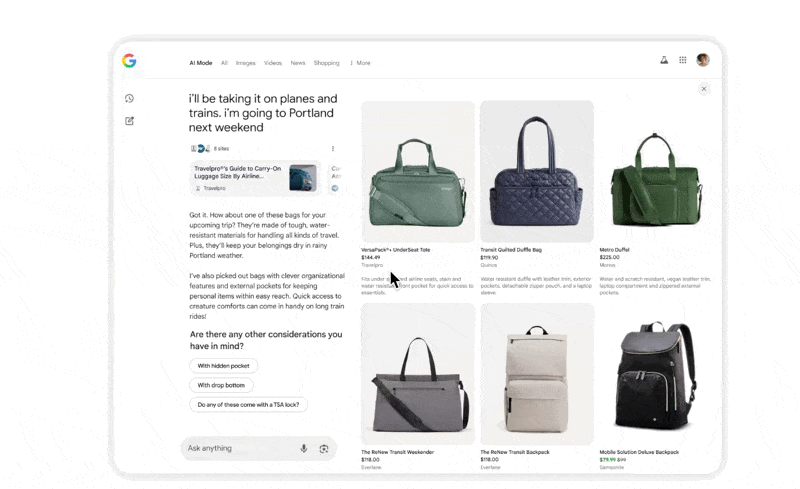
That changes everything from how people use search to how we structure information that supports it.
The Project Astra demo highlighted some interesting new capabilities that felt extremely relevant to my SEO Week presentation on search behavior and biases.
We’ve known about Project Astra since last year, but it now uses video and context awareness to interpret what you see in real time. In the demo at I/O, someone misidentified a garbage truck as a convertible, and Astra immediately corrected them. That kind of real-time contradiction is new and important. It shows Gemini is starting to handle false premise statements more proactively.
My research with Profound revealed that AI Overviews only refuted false premise statements about 7% of the time.
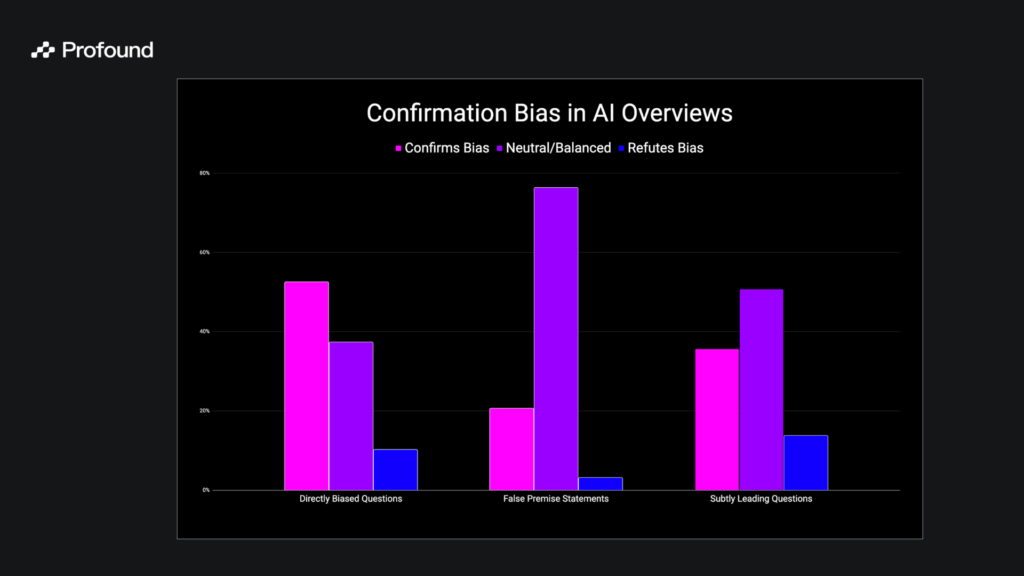
So this is a step forward. But it raises a more complicated question: What happens when the answer isn’t clear? Not every query has a right or wrong outcome. Some are subjective. Some are politically loaded. Some depend entirely on framing.
This is where bias creeps in.
Even with improved fact-checking, confirmation bias still shapes the output. Phrase a question in a particular way, and Gemini will likely reinforce your viewpoint rather than challenge it. Ask, “Why are electric cars bad for the environment?” You’ll likely get a list of downsides, even if the premise is misleading. Ask the inverse, and you’ll get praise.
It’s not just about accuracy but about framing. Generative search is still highly sensitive to how questions are worded. So while Gemini may flag clear mistakes, it’s far less clear how it will handle nuance, especially as AI becomes the intermediary for more and more decisions.
What do we do with this shift in the short term?
If you spend a minute on LinkedIn (or any social app), you’ll see a ton of prescriptive strategies and tactics that various practitioners will recommend.
And I, for one, am no exception! All that we’ve learned at Google I/O was covered or speculated about at SEO Week.
Let’s take a quick look at the functional implications of AI Mode and Personal Context.
How should SEOs shift their reporting frameworks in a world without consistent rankings?
Traditional keyword rankings won’t reflect the reality of personalized results. Instead, shift your reporting to these focus areas:
- Visibility metrics across platforms: Use monitoring tools like Profound to assess how often your brand appears in featured summaries, AI Overviews, or conversational search results. Assuming that they can monitor now that AI Mode is out of labs.
- Topical authority: Measure breadth and depth of content coverage on core topics rather than isolated keywords. Are you the go-to source across an entire theme?
- User behavior signals: Track engagement metrics that matter, such as time on site, scroll depth, and repeat visits, rather than surface-level clicks.
- Attribution modeling: Rebuild how you think about influence. AI agents may mention your brand without sending traffic. Use brand lift surveys, direct traffic trends, and memory-based attribution as proxies.
What kind of content performs best in hyper-personalized, conversational search environments?
The content that wins here does five things well:
- Contextually rich and user-specific: Address multi-layered queries. Not just “best protein powder,” but “best protein powder for women over 40 with joint pain who run 3x a week.” Create the entire conversational journey.
- Broad topic coverage: AI models surface authoritative sources across entire knowledge domains. You’re not ranking for a keyword; you’re showing up because your site understands the category.
- Structured + extractable: Use schema markup, clear headings, FAQs, and answer formats that LLMs can pull from.
- Conversational tone and intent-matching: Write in the way people ask. If people say, “I’m looking for…” or “What should I do if…?” reflect that in your copy.
- Authority signals: Include first-party insights, reviews, and personal stories. These are harder to replicate and signal trust and authenticity.
How can brands prepare for agent-driven transactions and AI-powered purchase journeys?
This is going to be the next major conversion shift. To get ahead:
- Optimize for tasks, not just questions: Treat your site and product data as something an agent will interact with, not just a user. Agents will parse your content, pricing, inventory, and policies to make decisions for the user.
- Structured data infrastructure: Your product info, pricing, location data, and availability need to be easily parseable by machines. Schema.org, APIs, product feeds, and open data protocols are key.
- Agent-ready content and commands: Think about user intents like “book,” “schedule,” “find,” “buy.” Align your content and CTAs to those outcomes. Reduce friction and anticipate the full path from question to action.
- Testing and training: Use Gemini, ChatGPT, and Perplexity to simulate how your brand shows up in agent-style queries. Look for missing data, unclear phrasing, or better competitors and refine accordingly.
Listen. Search behavior is changing. Fast.
AI Mode shifts the conversation, literally. And while Google seems poised to roll out what Apple was trying to do with “Apple Intelligence” before botching the launch, it will be messy. As someone living in both ecosystems, Google and Apple, I’m curious to see how satisfying this new environment actually is.
But one thing’s clear:
We’re not optimizing for a single result anymore. We’re optimizing for an infinite number of personalized ones. It all plays into iPullRank’s emerging discipline, Relevance Engineering.


